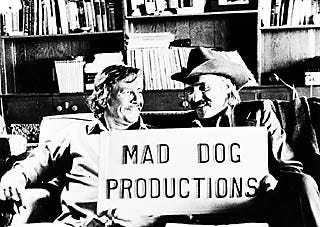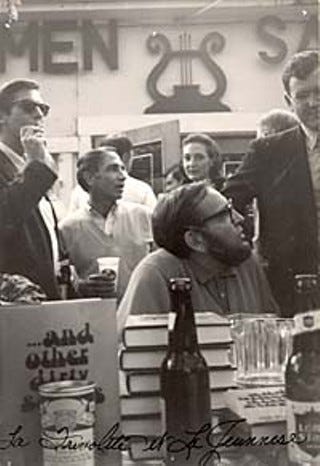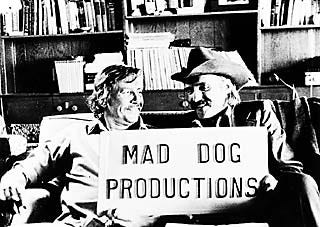Mad Dog: A Resurgence of a Forgotten Attitude.
"I’m not here to play nice in a world that rewards silence."
The Mad Dogs were a literary collective in Austin during the late 1970s and early ’80s, and they were here to do so in uniquely fringe style. They were writers, poets, actors, future public figures and thinkers with sharp tongues and even sharper minds. They gathered in bookstores, smoky bars, they left their mark on pages, and made trouble in the streets.
In 2001 Clay Smith published an article in the Austin Chronicle, titled “Notes on Mad Dogs: On Being Young, Talented, and Slightly Insane in Old Austin”. In the article, Clay discusses how these “literary outlaws”, changed the fabric of our culture, “Mad Dogs did what young artists and intellectuals in a notably conservative environment tend to do… they fought with and changed the culture.”
I found it to be a very interesting and relevant read that raised a lot of feelings for me, especially regarding the kind of consumers we’re engaging with, as tech companies increasingly hire younger talent who may have had less exposure to diverse cultural experiences, to put it plainly, Austin has become pretty f*cking basic.
Austin wasn’t always "weird", that was carefully crafted by the creative community. Everyone chipped in, and growing up this was a very lighthearted, playful, and inviting city. Before the tech boom, before SXSW and boutique hotels, the city’s cultural identity was more cautious and conservative. And today, on the west side of Austin, I’d say it still is. However, I think that is where we can read, and gather some inspiration from this group that certainly knew how to stir the pot strategically in order to move the needle forward.
Instead of shying away from the conservative aspects of our culture, they stood toe to toe, and into that safe world walked the Mad Dogs, dragging behind them a growling mix of punk energy, literary ambition, and street smarts.
They didn't simply publish zines or write manifestos, they lived their resistance. Their writing was raw, chaotic, and hungry. They revered figures like Rimbaud, Ginsberg, Burroughs, and Bukowski, but they were also deeply rooted in the Texas landscape, a place that they simultaneously loved, loathed, and refused to leave. They wrote about sex, politics, drugs, beauty, and the brutality of language itself. They spit in the face of the status quo, even as they taught in classrooms or waited tables to survive.
What made the Mad Dogs dangerous was not just their style but their sincerity. They believed that writing mattered. They believed, radically, that Texas could contain multitudes, that you didn’t have to run to New York or San Francisco to be an artist. They were proof that resistance didn’t always have to be loud to be seismic. It could be written in ink and published by hand, shouted across dining tables, or the next big idea written on a cocktail napkin in a crowded bar.
Some of them would go on to become professors, novelists, or even renowned personalities like the late Larry King, others would fade into cult legend that is now being forgotten. But their impact still ripples through Austin’s creative scene. They helped shift the city’s imagination, breaking open space for messier, more authentic voices.
In doing so, they gave Austin something that couldn't be bulldozed or gentrified, a spirit of rebellious creativity. A belief that art, even in the unlikeliest of places, could change not just people but places.
They were mad. They were dogs. And they rewrote the rules.
The Mad Dogs didn’t behave, and they didn’t ask permission. They fought with culture because culture was worth the fight. That’s what made them dangerous, and that’s what made them necessary.
Reflection:
For me, what inspires me about this group is it is about standing in a room and refusing to be small or soft-spoken when something real needs to be said. It's about not flinching when the air gets thick with tension. It's about the old-school belief that your words mean something. That if you say a thing, you better damn well stand behind it. That’s resistance, and real resistance has teeth.
We live in an age where comfort has replaced conviction. Where men talk big, but shrink from confrontation in real life. We've become enamored with passive aesthetics, curated opinions, curated emotions, curated lives. But I’m not here to be curated. I'm here to make people feel something again. To inject some electricity into our scene. To drag some conflict back into these sterilized spaces and force people to look each other in the eye. Discomfort is the quickest way to grow.
Just like the Mad Dogs, I’m not here to play nice in a world that rewards silence. I’m not here to smooth over the rough edges. I’m here to bring back the bark, loud, defiant, disruptive. To remind people that words have weight, there is no dress rehearsal in life. Men used to know that. You said a thing, you meant it. You stood toe to toe and let the words do what they were made to do, build or burn. That kind of presence, that kind of heat, has been missing.
The culture has softened. The leash has tightened. But some of us still bite, and we’re coming for what’s ours. I’ll be the first to say that shaking things up, and just disrupting for the hell of it doesn’t necessarily mean that it is productive. That’s why our philosophy is to to disrupt and then define. I’m sure one day we will mature into this space, and learn how to be a bit more diplomatic, but for now, we are a little pissed off and we’re here to make some noise. See you soldiers out there.
Peace feels appropriate,
Evan H. Duvall








